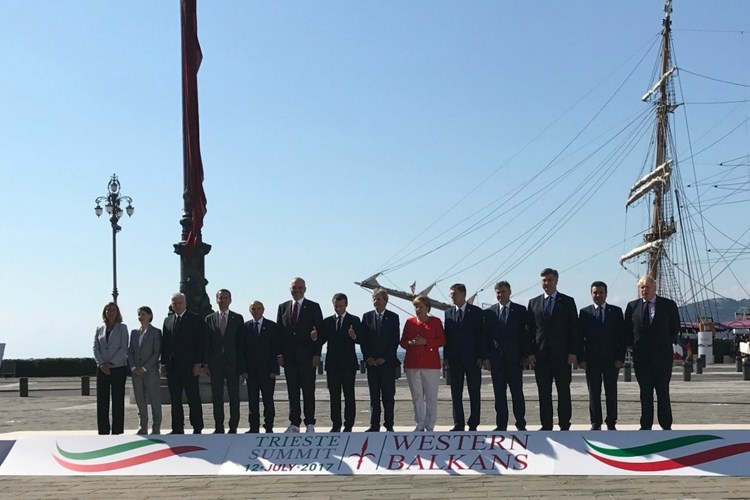- Published: 13.07.2017.
Plenkovic says will talk Croatia-Slovenia arbitration award with Merkel
Croatian Prime Minister Andrej Plenkovic said in Trieste on Wednesday that he would talk about the Croatian-Slovenian border dispute with German Chancellor Angela Merkel during the evening and present Croatia's position.
Germany called on Croatia before an arbitration award on the border was made public on June 29 to respect and implement it.
"I believe she is very well acquainted with our position. We each stand on their own position, but what's extremely important for Croatia is that there is good will for bilateral talks which would resolve this issue," Plenkovic told reporters after a Berlin Process summit.
He said the framework of the decision whereby the Croatian parliament withdrew from the border arbitration in 2015 was clear.
Plenkovic said he would acquaint Merkel with Croatia's position so that the context of Croatian-Slovenian relations concerning the border could be put in a broad European context. He said Croatia and Slovenia were not the only countries with an outstanding border issue and that many were resolving such issues in an almost discreet and invisible way.
"We must all together put this within the real frameworks of normal activity. I am personally very pleased that the Croatian public and political stakeholders have reacted responsibly. There's no excessive excitement concerning this topic," he said, adding that he would meet with Slovenian PM Miro Cerar, with whom he met earlier today, in September again.
He said they had "established an almost friendly relationship... we have established trust," adding that he would like all outstanding issues between Croatia and Slovenia to be on the table, including the border. "Our starting position on the border issue is clear, while Slovenia's position is defined by the arbitration award from proceedings from which Croatia withdrew, through Slovenia's fault."
Speaking of the summit in Trieste, he said it was reflected in a large number of concrete infrastructure projects, the signing of agreements on a transport community, and the advancement of regional economic cooperation.
"This Berlin process is an attempt to bring closer, in this very particular format, what the EU is doing on the internal front to states in Southeast Europe in such a way that their economic and social reforms keep up with what will await them in the next integration phase. The leaders from the region are a little frustrated because they find the whole process very long in the institutional sense."
The summit agreed an action plan on joint economic cooperation and several specific infrastructure projects.
Plenkovic said the aim of the summit was to launch cooperation and transport connections through infrastructure projects, and to give the leaders of the countries in Southeast Europe a possibility to talk with the German chancellor or the French president, for example.
Asked if Croatia would agree to a concept of a civil Bosnia and Herzegovina (BiH), allegedly an initiative by the German administration that would abolish the constitutionality of the three peoples in the country, Plenkovic said Croatia's position "is very clear, which is that the BiH Constitution was conceived on the principle of one state, two entities and three constituent peoples. We want this equality, especially of Croats who, according to the latest census, make up a little over 15% in BiH, to be seen in all segments of the country's functioning."
He said Croatia expected amendments to the electoral law to ensure that equality before next year's elections.
Text: Hina
